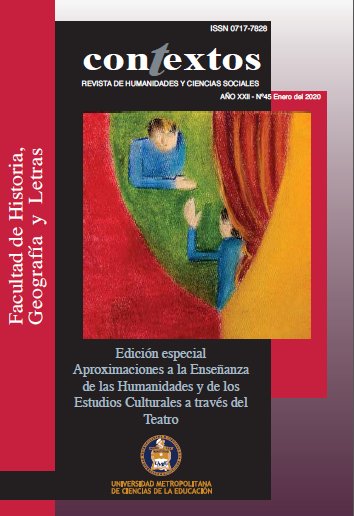Main Article Content
Jun 21, 2019
Abstract
This article provides an insight into the theatre workshop project in a Spanish as a Foreign Language class as a way to promote cultural knowledge about Spain (past and present), as well as deepening into advanced Spanish grammar, and reinforcing oral and written language skills (conversation and composition) in the target language. The workshop is integrated in a general course of Spanish as a foreign language whose lingua franca is Spanish itself. The workshop is targeted at undergraduate upper-intermediate college students and aims the reading and analysis of Federico García Lorca´s work Bodas de sangre (Blood Wedding), and the dramatic representation of a number of creative adaptations of the original text written by the students themselves in which they expose and analyze a particular cultural element of their choice.
Downloads
Policies for open access journals
Authors who publish here accept the following terms: Authors will keep their copyright and will guarantee the journal the right to the first publication of their work, which will be subject to the Licence of Creative Commons acknowledgement, which allows for the use of this material only if the authorship is credited and the original source is acknowledged (the journal’s URL), and if it is not used with commercial ends and with any derivations of the original work.
Authors may adopt other non-exclusive license agreements of distribution of the published version (e.g. to save it onto a digital institutional archive or publish it in a monographic volume) only if the initial publication of this journal is indicated.
It is permitted and recommended for authors to divulge their work on the Internet (e.g. institutional digital archives or webpage) before and during the submission process, which may lead to interesting exchanges and increase the citations of the publication. (See Open Access Effect).
References
Beehner, M. B.1990. “Creating a Dramatic Script for Dynamic Classroom Learning”. Education.110(3): 283-288.
CNCA. 2016. Manual de Apoyo al Facilitador.Taller de Teatro:Protagonistas en el Juego. Consejo Nacional de la Cultura y las Artes, Gobierno de Chile. [en línea]. Disponible en: https://www.cultura.gob.cl/publicaciones/manual-apoyo-facilitador-teatro/. [Consulta 15/11/2018].
Corral Fullà, Anna. 2013. “El teatro en la enseñanza de lenguas extranjeras: la dramatizacióncomo modelo y acción”. Didáctica. Lengua y Literatura. 25:117-134.
Díez Coronado, Mª Ángeles. 2016. “Porque a escribir se aprende escribiendo. Una propuesta para el aula de ELE”. Tejuelo. 24:92-110.
García Lorca, Federico. 1986. “Paisaje”. Poema del Cante Jondo. Madrid: Espasa-Calpe[1921].
García Lorca, Federico. 2001. Bodas de Sangre. Madrid: Ediciones Cátedra.
García Lorca, Federico. 2007. “El Cante Jondo: Primitivo Canto Andaluz”. [1922]. FedericoGarcíaLorca.net [En línea]. Disponible en: http://federicogarcialorca.net/obras_lorca/el_cante_jondo.htm. [Consulta 15/11/2018].
García-Huidobro, Verónica. 1996. Manual de Pedagogía Teatral. Santiago de Chile: Edit. Los Andes.
Gómez Alonso, Juan Carlos. 2017. “Intertextualidad, Interdiscursividad, y Retórica Cultural”. Tropelías: Revista de Teoría de la Literatura y Literatura Comparada. Número Extraordinario 1:107-115.
Josephs, Allen;Juan Caballero. 2001. “Introducción” en Bodas de Sangre. Madrid: Ediciones Cátedra: 13-90.
Mantovani, Alfredo. 2015.“Cómo superar el miedo escénico” [Taller Organizado por Proexdra]. Almería, España.
Poveda, Lola. 1995. Ser o no Ser: Reflexión Antropológica para un Programa de Pedagogía Teatral. Madrid: Narcea.
Torrecilla, Jesús. 2008. “Estereotipos que se resisten a morir: El andalucismo de Bodas de Sangre”. Anales de la Literatura Española Contemporánea. 33(2): 229-249.






